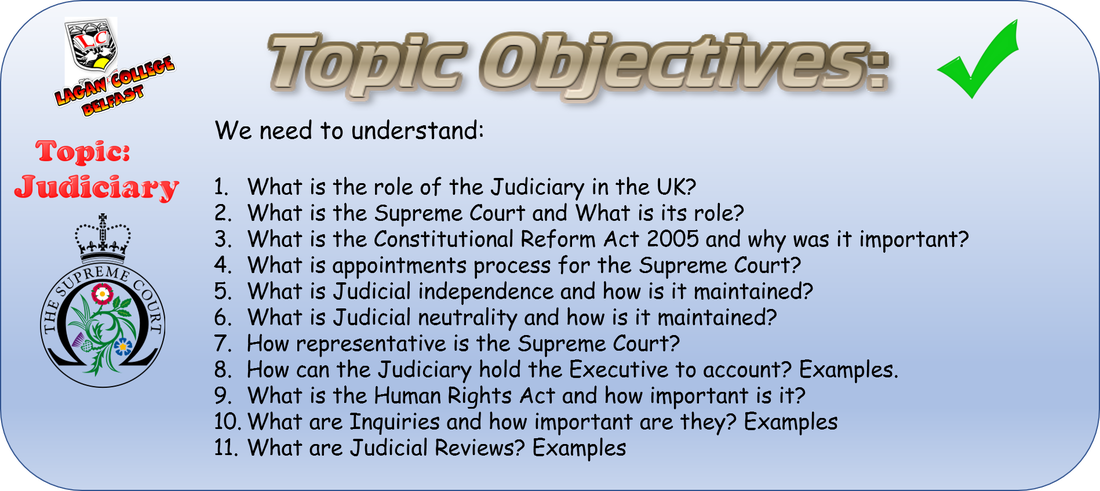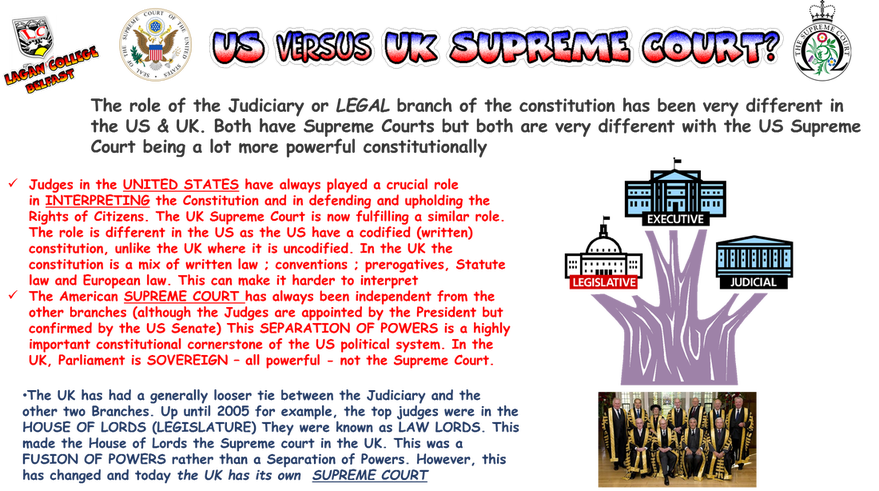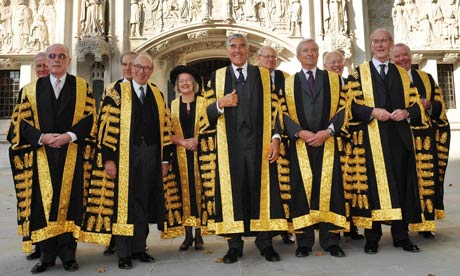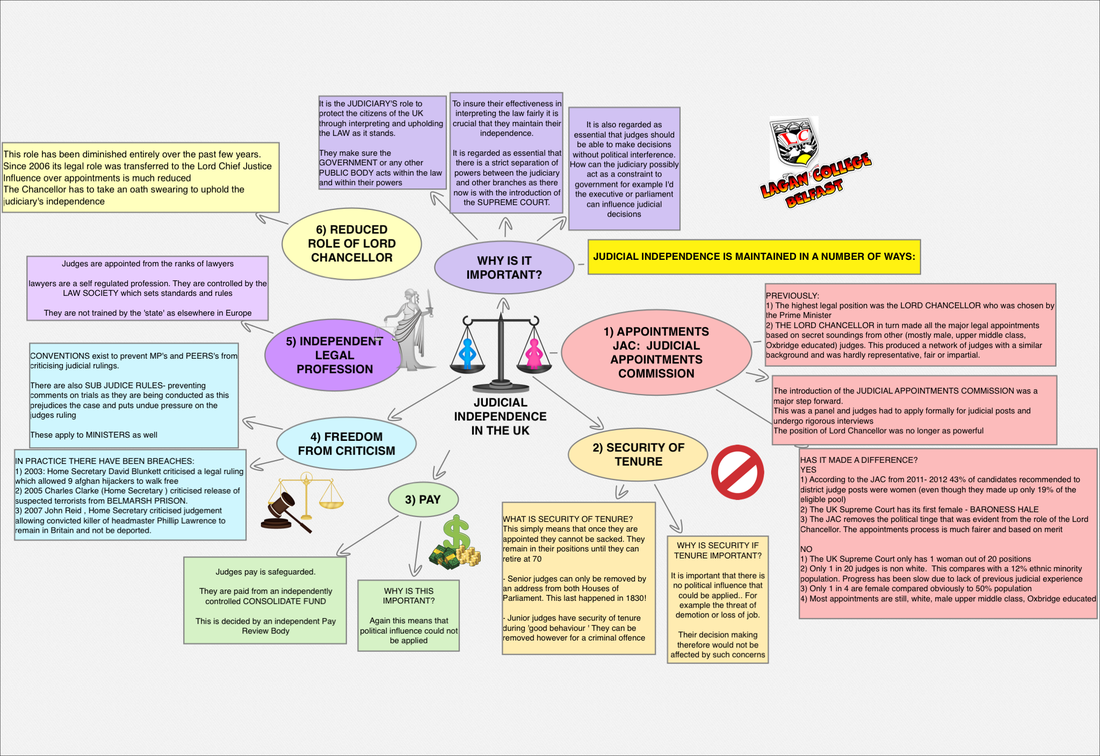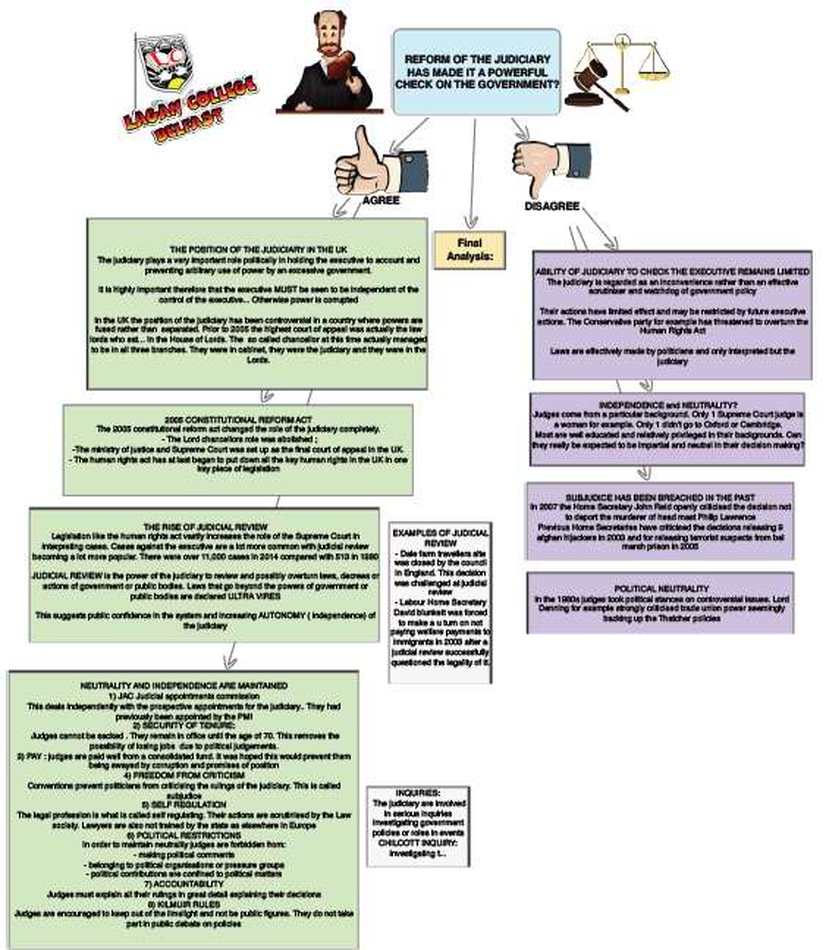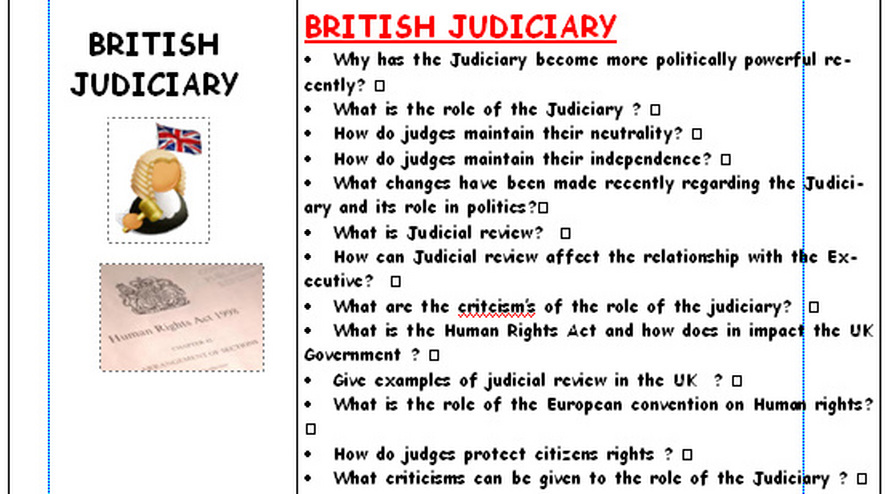The Role of the JUDICIAL BRANCH of Government is to INTERPRET THE LAW. Traditionally, in the past, this branch in the UK has been a relatively quiet and powerless part of the constitutional system. However, recent changes and reforms have made it much more independent and arguably much more effective - and therefore much more POLITICAL.
The role of judges is becoming increasingly POLITICAL in the UK with increasing power to hold the Executive to account over its decisions as well as uphold the Rights of British Subjects

- It can hold the Government to account through actions such as JUDICIAL REVIEW or PUBLIC INQUIRIES
- This can sometimes bring it into conflict with the Government (Executive)
WHAT IS THE RULE OF LAW?

This is one of the Key principles of the UK’s Uncodified (unwritten) Constitution.
It means the ‘Law should apply EQUALLY to ALL, Rulers and Ruled alike’
It is to be a ‘Government of LAWS Not a Government of MEN’ (A.V Dicey)
This means that Government should ideally be a set of Laws (set Rules) which ‘Men’ (everybody) have to abide by no matter what their place in society.
There is considerable debate however over how far the Law ‘rules’ the UK
These are the most important Principles :
It means the ‘Law should apply EQUALLY to ALL, Rulers and Ruled alike’
It is to be a ‘Government of LAWS Not a Government of MEN’ (A.V Dicey)
This means that Government should ideally be a set of Laws (set Rules) which ‘Men’ (everybody) have to abide by no matter what their place in society.
There is considerable debate however over how far the Law ‘rules’ the UK
These are the most important Principles :
1) NO ONE IS ABOVE THE LAW

· Everyone is ‘Bound by the Law’ (Ministers, Public Officials and others)
· Public Officials should therefore use their power reasonably and Not exceed the Limits placed on its use
· This is UPHELD by:
CONCERNS AND CRITICISMS
· Public Officials should therefore use their power reasonably and Not exceed the Limits placed on its use
· This is UPHELD by:
- Administrative Law: Laws governing powers and duties of Public authorities
- Judicial Review : The Power of the Judiciary to ‘review & possibly overturn laws, decrees and actions of other branches of Govt. and public bodies
CONCERNS AND CRITICISMS
- Many Powers of the PM and other Ministers are based on Royal Prerogative— This is NOT subject to Judicial oversight
- As Parliament is SOVEREIGN, it can make, unmake and amend any law it wishes to—so is therefore ‘ABOVE THE LAW’
- The Principle of PARLIAMENTARY PRIVILEGE, (This is a set of Legal privilege’s given to MPs and Peers to safeguard them from outside interference) This means that MPs and peers are not subject to legal restrictions on what they can say in Parliament.
- The Queen (as head of the legal system) is not properly subject to the Law
2) EQUALITY BEFORE THE LAW

The Law should treat ALL citizens alike
EVERYONE should have the same Legal Rights and the same access to the Legal system regardless of Race, Creed, Culture, Religion, Gender Social Status etc
CONCERNS AND CRITICISMS
EVERYONE should have the same Legal Rights and the same access to the Legal system regardless of Race, Creed, Culture, Religion, Gender Social Status etc
CONCERNS AND CRITICISMS
- Legal Disputes may be prohibitively costly. Only the wealthy can afford top lawyers
- Access to Legal aid is not always easy and may exclude those from Mid Income groups
- Judges may be biased against women or ethnic minorities for example… The majority of Judges come from a White, Christian, Upper Middle Class Background and are mostly Men! Is this fair and Representative?
3. THE LAW IS ALWAYS APPLIED

Disputes must be solved by the application of the Law rather than other means
CONCERNS AND CRITICISMS
- There must therefore be a certainty of Punishment for breaches of Law.
- This must apply in all circumstances
- There should be punishments Only for breaches of the Law
CONCERNS AND CRITICISMS
- Not all crimes ARE reported and therefore legally addressed (most rapes go unreported)
- Trial by the media means that people may be punished without legal proceedings taken place or perhaps despite being acquitted
4) LEGAL REDRESS IS AVAILABLE THROUGH THE COURTS
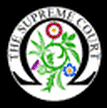
- If peoples Rights have been infringed (by citizens, Organisations or the State) they should be able to protect themselves through the Law.
- This should mean that the Law should defend fundamental Human Rights.
- This aspect should Safeguard the INDIVIDUAL from the STATE.
- There is now the BRITISH SUPREME COURT. This is designed to uphold the rights of British subjects.
CONCERNS AND CRITICISMS
- In the UK there is NO BILL OF RIGHTS to protect fundamental Human Rights. (A Bill of Rights is a document specifying the rights and freedoms of the Individual.)
- The Human Rights Act can in theory be set aside if Parliament wants
- Access to the European Court of Human Rights is difficult, time consuming and Expensive.
IN THEORY...

LAW and POLITICS are supposed to be different things.
· Their NEUTRALITY from other institutions of Government makes them ‘Above Politics’
- Law is a form of Social Control (defining what CAN and CANNOT be done)
- It is important that judges administering this law are meant to act in a strictly non-political way.
· Their NEUTRALITY from other institutions of Government makes them ‘Above Politics’
IN PRACTICE
Law and Politics ARE closely related:
Law and Politics ARE closely related:
- Laws that Judges administer are MADE by Politicians (and therefore reflect political Moral and social values)
- Laws are INTERPRETED by judges—and therefore reflect their own beliefs and prejudices—Can they be TRULY impartial?
- EXTERNAL PRESSURES: Ministers ; MP’s; Tabloid Press (John Venables case) Lobby Groups. They all express their views on judicial cases, especially high profile cases—involving deportation, terrorism or rape.
- In recent Years especially, CIVIL LIBERTIES have become a key battleground between Judges and Ministers
- Finally this is a time of MAJOR CHANGE in the Judiciary— The First UK SUPREME COURT has been established—which has the potential to make senior judges in the UK into ‘POLICY MAKERS’ ( This sets them on a course towards US style Judicial Powers and Role)
BEFORE 2005:
- The highest court in the land was the HOUSE OF LORDS. Here the LAW LORDS met and discussed the most important cases in the UK. The fact that the Judiciary was in effect part of the Legislature was a concern to many.
- There were other issues too - such as the fact that the highest legal position in the land - THE LORD CHANCELLOR was chosen by the PRIME MINISTER - therefore making it a political tinged choice.
- In turn the Lord Chancellor made all the other important judicial appointments! For appointments to the high court, the Lord Chancellor would hold secret soundings with senior judges [all but very few of them white men, former barristers] who recommended other white men like themselves! This unsurprisingly brought a great deal of criticism.
- This system was in effect a FUSION OF POWERS rather than the SEPARATION OF POWERS which is regarded as being essential in any democracy. The Judiciary are regarded as having a vital role in HOLDING THE GOVERNMENT or PUBLIC BODIES TO ACCOUNT on behalf of the CITIZENS.
THE CONSTITUTIONAL REFORM ACT 2005
- The Constitutional Reform Act was introduced under TONY BLAIR's government.
- It created the UK Supreme Court - the highest court in the UK –
- This was formally introduced in 2009.
- It has 12 judges led by Lord Philips.
- All judges are expected to be scrupulously independent and must NOT have any political connections.
- The judiciary in the UK has become more prominent in political debates in recent years.
WHO IS IN THE SUPREME COURT?
|
CURRENT PRESIDENT OF THE SUPREME COURT (Sept 2017):
|
|
|
|
|
One Crucial aspect of the Role of the Judiciary is that judges are meant to be strictly IMPARTIAL (Neutral) and NON POLITICAL
This is a basic difference between Liberal Democracies and Authoritarian regimes. In the USSR or Nazi Germany the Judiciary would act as a willing enforcer of the Regime. In Liberal democracies the authority of the Law is linked to the fact that Judges are supposed to be Non Political and Independent. |
In practice Judges may be political in 2 ways:
These are supposed to be controlled through the principles of :
- EXTERNAL BIAS: They may be influenced by other Political bodies such as the Executive and Parliament
- INTERNAL BIAS: They may be vulnerable to their own prejudices and influences (The background of judges is often very different to those they judge)
These are supposed to be controlled through the principles of :
- JUDICIAL INDEPENDENCE
- JUDICIAL NEUTRALITY
Judicial Independence is a KEY part of the Constitution.
There should be a strict separation between the judiciary and other branches of Government. Judges therefore should apply the law professionally and without Political Interference. This is a Vital Guarantee of the Rule of Law. Law after all Cannot act as a constraint on the Government IF the Executive and Parliament can influence judges interpretations of the Law? Judicial Independence is upheld in a variety of Ways:
There should be a strict separation between the judiciary and other branches of Government. Judges therefore should apply the law professionally and without Political Interference. This is a Vital Guarantee of the Rule of Law. Law after all Cannot act as a constraint on the Government IF the Executive and Parliament can influence judges interpretations of the Law? Judicial Independence is upheld in a variety of Ways:
1) APPOINTMENT PROCESS

Appointments of Judges are supposed to involve little political interference— OTHERWISE Judges would simply be selected on their sympathy for the Government.
HOW HAVE APPOINTMENTS CHANGED
This is one area of SIGNIFICANT CHANGE in constitutional affairs that you really have to be aware of.
- Judges HAD previously been appointed by the Prime Minister and the Lord Chancellor—this made it very difficult to rule out political consideration.
- The establishment of the JUDICIAL APPOINTMENTS COMMISSION (JAC) has introduced greater independence into the process
- This was introduced under the Constitutional Reform Act 2006 and ensures appointments for any new posts are based solely on merit.
- Judges have to now formally apply to judicial positions and go through an interview process
- New Judges are now Members of the new British Supreme Court rather than Law Lords.
HOW HAVE APPOINTMENTS CHANGED
This is one area of SIGNIFICANT CHANGE in constitutional affairs that you really have to be aware of.
- Previously appointments of judges were a PREROGATIVE POWER OF THE PRIME MINISTER.
- The PM's were able to choose the chief judiciary in the land and these also were automatically senior members of the House of Lords, known as LAW LORDS. (They were recommended on the advice of the Lord Chancellor but the PM had final say)
- The Prime Minister also chose the chief law lord known as the LORD CHANCELLOR. The Lord Chancellor was the only person who could call himself a member of 1) The HOL 2) The Judiciary and 3) The Executive (they had a place in the Cabinet)
2) SECURITY OF TENURE

This means once they are Appointed they cannot be sacked—They remain in office until retirement at 70
- Therefore the possibility of removal or demotion for political reasons cannot affect their decision making
- Senior judges can only be removed by an address of both houses of Parliament (last done 1830)
- Junior Judges have security of Tenure during ‘good behaviour’ They can be removed for criminal offence
3) PAY

Judges pay is also safeguarded from political influence
Judges are paid out of a Consolidated fund— This is decided by an independent Pay review body
Judges are paid out of a Consolidated fund— This is decided by an independent Pay review body
4) FREEDOM FROM CRITICISM

There are conventions preventing MP’S and Peers from putting pressure on judges by criticising Court rulings and judicial decisions in Parliament.
· These are meant to apply to Ministers as well.
· The ‘SUB JUDICE’ rule forbids people from commenting on trials currently being considered.
HOWEVER:
This Convention HAS been breached in practice:
· These are meant to apply to Ministers as well.
· The ‘SUB JUDICE’ rule forbids people from commenting on trials currently being considered.
HOWEVER:
This Convention HAS been breached in practice:
- In 2003 David Blunkett (Home Secretary) commented on a legal ruling involving the release of 9 Afghan Hijackers.
- In 2005 Charles Clarke (HS) criticized publicly the release of prisoners from Belmarsh Prison.
- In 2007 John Reid (HS) Attacked the decision not to deport the murderer of Philip Lawrence
5) INDEPENDENT LEGAL PROFESSION

Judges appointed from ranks of Lawyers belonging to Legal profession.
- This profession is ‘Self Regulated’ and autonomous (self ruling) controlled by the LAW SOCIETY
- Lawyers therefore are not trained by the State as elsewhere in Europe—this gives them more independence
6) ROLE OF LORD CHANCELLOR

This role was once a major threat to Judicial Independence: being Head of the Judiciary, in the House of Lords (Legislature) AND a member of CABINET (Executive)
· Since 2006 the former judicial role has been transferred to the Lord Chief Justice and the Lord Chancellor's influence over appointments, as we have seen, has been much reduced
· Under the Constitutional Reform Act 2005 the Lord Chancellor has to swear an oath to protect the independence of the Judiciary. The role has been further legitimised by being absorbed into that of Minister for Justice
· Since 2006 the former judicial role has been transferred to the Lord Chief Justice and the Lord Chancellor's influence over appointments, as we have seen, has been much reduced
· Under the Constitutional Reform Act 2005 the Lord Chancellor has to swear an oath to protect the independence of the Judiciary. The role has been further legitimised by being absorbed into that of Minister for Justice
INDEPENDENT OR NOT?

Traditionally the concern about judicial independence focused on appointments. However the JAC and reduction of the powers of Lord Chancellor has led to this being somewhat redressed.
· There is concern over the growing willingness of Cabinet Ministers to publicly criticise decisions. The principle of independence in this respect has been much tested. HOWEVER, Judges in response have been heavily defensive of their role and have shown determination to uphold the rule of Law.
· Public clashes between MPs and Judges show a HEALTHY judicial independence. Ministers only real power left IS to either publicly criticise OR introduce new acts of Parliament
· There is concern over the growing willingness of Cabinet Ministers to publicly criticise decisions. The principle of independence in this respect has been much tested. HOWEVER, Judges in response have been heavily defensive of their role and have shown determination to uphold the rule of Law.
· Public clashes between MPs and Judges show a HEALTHY judicial independence. Ministers only real power left IS to either publicly criticise OR introduce new acts of Parliament
|
|
The other way judges may be POLITICAL is through THEIR own PERSONAL political Bias. They themselves may lack NEUTRALITY. Critics argue that this may influence their judgement.
Judicial Neutrality is maintained in a number of ways:
- The term 'Neutrality' suggests Judges do not have any Political sympathies. They have been termed ‘Political Eunuchs’
- Obviously in practice this is nearly impossible.—all people have views and opinions.
- As a result like other professions such as the Police or Civil Service, they have to ensure these beliefs do not affect their professional behaviour
- How is Judicial Neutrality therefore maintained? How effective is it?
Judicial Neutrality is maintained in a number of ways:
1) POLITICAL RESTRICTIONS

It is essential that the Law is as free as possible from any 'prejudice' Its reputation stands on it being neutral. There are a number of limits the judiciary follows to help maintain political neutrality:
- Judges are not supposed to engage in open political activity
- Judges are not allowed to be members of political parties
- They are also not expected to express open support for Pressure Groups or protest movements.
2) LEGAL TRAINING

- Their training process (often over 20 years) is designed to enable judges to focus entirely on Legal considerations
- Their ability to act impartially is aided by the requirement that judgement is always based on evidence
3) ACCOUNTABILITY

· Senior judges must EXPLAIN their rulings highlighting specific points of Law
· When Law lords hand down a judgement they have to provide an extensive written account of proceedings explaining how they based their decisions
· There is also the system of APPEALS— Therefore protection through appeal to higher Courts.
· When Law lords hand down a judgement they have to provide an extensive written account of proceedings explaining how they based their decisions
· There is also the system of APPEALS— Therefore protection through appeal to higher Courts.
4) NOT PUBLIC FIGURES
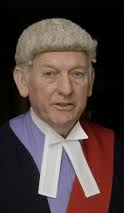
· Judges have been discouraged from speaking out on Political matters and becoming involved in public controversy
· The ‘KILMUIR RULES’ exist which forbade judges from participating in public debates about policy matters to preserve their neutrality—However these restrictions have been relaxed from the 1980’s
· The ‘KILMUIR RULES’ exist which forbade judges from participating in public debates about policy matters to preserve their neutrality—However these restrictions have been relaxed from the 1980’s
CRITICISMS

Most attacks on judicial Neutrality have traditionally come from the Left wing of Politics
If you think of Judges what do you think? Usually an old, white, male from a very posh, upper class background?
Professor John Griffiths argued that there is an inbuilt Conservative Bias in Senior Judiciary. He argued that – given their white, male and middle / upper-class background - British Judges are primarily concerned with the interests of the state; the preservation of law and order; and with promoting political views normally associated with the Conservative Party. As such, he argued, this may affect their decisions on race relations, industrial relations and public order issues.
He argued the senior judiciary were overwhelmingly:
MALE ; WHITE ; UPPER-MIDDLE CLASS; PUBLIC SCHOOL (OXBRIDGE EDUCATED)
IS THIS TRUE?
FIGURES in 2007
· Of 639 circuit judges, only 73 female
· Of 108 High Court Judges only 1 was from an ethnic minority
· 70% of Judges were Privately educated ; 78% went to Oxford / Cambridge
Can they therefore be truly Neutral when it comes to issues of Law such as Gender, social background or Ethnicity?
EXAMPLE:
INCREASINGLY PUBLIC POLICY STANDS
As has been mentioned as well, despite the ‘Kilmuir Rules’ there has been a growing trend for senior judges in the UK to take a public stand on policy issues. This is due to the removal of restrictions in the 1980s on judges and public debate in the belief that their experience would AID the policy process.
Through articles Speeches and Judgements in recent years, judges have demonstrated growing support for human rights.
These interventions demonstrate the robust independence of the senior judiciary in the UK
EXAMPLES
If you think of Judges what do you think? Usually an old, white, male from a very posh, upper class background?
Professor John Griffiths argued that there is an inbuilt Conservative Bias in Senior Judiciary. He argued that – given their white, male and middle / upper-class background - British Judges are primarily concerned with the interests of the state; the preservation of law and order; and with promoting political views normally associated with the Conservative Party. As such, he argued, this may affect their decisions on race relations, industrial relations and public order issues.
He argued the senior judiciary were overwhelmingly:
MALE ; WHITE ; UPPER-MIDDLE CLASS; PUBLIC SCHOOL (OXBRIDGE EDUCATED)
IS THIS TRUE?
- Brenda Hale became the first female Law Lord in 2004.
- Hale had criticised a judiciary as "mainly male, overwhelmingly white, and the product of a limited range of educational and social backgrounds".
- In Italy, 60% of new judicial appointees are women and the Netherlands appointed its first woman judge in 1947
FIGURES in 2007
· Of 639 circuit judges, only 73 female
· Of 108 High Court Judges only 1 was from an ethnic minority
· 70% of Judges were Privately educated ; 78% went to Oxford / Cambridge
Can they therefore be truly Neutral when it comes to issues of Law such as Gender, social background or Ethnicity?
EXAMPLE:
- In the 1980s in particular Judges such as Lord Denning and Donaldson were strong critics of Trade Union Power. Judges decisions now are of course much more diverse and Liberal but diversity has yet to be seen in the make up of the Judiciary
INCREASINGLY PUBLIC POLICY STANDS
As has been mentioned as well, despite the ‘Kilmuir Rules’ there has been a growing trend for senior judges in the UK to take a public stand on policy issues. This is due to the removal of restrictions in the 1980s on judges and public debate in the belief that their experience would AID the policy process.
Through articles Speeches and Judgements in recent years, judges have demonstrated growing support for human rights.
These interventions demonstrate the robust independence of the senior judiciary in the UK
EXAMPLES
- In 1998 Law Lords ruled that the sick Ex Dictator of Chile be Extradited (Legally transferred) to Spain for trial on the charges of Murder Torture and Genocide. This was only overturned when it was revealed one Law Lord Lord Hoffmann had connections with the Human Rights Pressure Group Amnesty International.
- Lord Bingham, the Lord Chief Justice said the Rule of Law should include the protection of Fundamental Human Rights. This he said should be based in international Law
- The Current Lord Chief Justice Lord Philips criticized the wider use of Mandatory sentences (these are fixed sentences passed in legislation and removing the Judges right to discretion)
REFORM OF THE JUDICIARY
CONSTITUTIONAL REFORM ACT—the Reforms and Advantages

GOOD POINTS
- They substantially strengthen the Separation of Powers. This was done by tackling 2 ANOMALIES:
- The Highest Court of Appeal in the UK, THE LAW LORDS, Sat in the HOUSE OF LORDS—This created a FUSION BETWEEN THE JUDICIARY and THE LEGISLATURE
- The Office of LORD CHANCELLOR (which UNIQULEY fused: Judicial (Head of Judiciary) Legislative ( Presiding officer of the House of Lords) and Executive ( Cabinet Minister)
1 POWERS OF LORD CHANCELLOR AND INDEPENDENCE OF JUDICIARY
The post of Lord Chancellor has now MERGED with that of Secretary of State for Constitutional Affairs.
The Lord Chief Justice is now head of the Judiciary and a separate Lords Speaker has been appointed.
2 POWERS OF APPOINTMENT:
The CRA also addressed Long Term concerns over the political powers of Appointment—which had been appointed previously by Ministers—This is now handled by The Judicial Appointments Commission—this allows for much more Independence
3 MORE DIVERSE JUDICIARY:
Attempts have also been made to make the Senior Judiciary much more diverse and socially representative. This has happened slowly through the make up of the JAC itself
NEGATIVES
- Although the proposed Supreme Court does help to address a number of long standing Constitutional problems. Its Creation has DIVIDED the Judiciary and provoked a number of concerns:
- With increasingly regular battles between Government / Judiciary the Govt has been accused of trying to ‘tame the courts’ The Govt however is likely in this respect to be disappointed— Changes to Appointments and the very title SUPREME court may encourage Justices to be bolder in defending what they believe should be a proper balance between the State and Individual.
- There is also concerns over the Appointments procedure. To make appointment based on Merit, expertise and experience—They will continue to be chosen from the long standing list of Barristers
- The Supreme Court for some has been viewed as a missed opportunity for more radical reform—particularly those wanting an entrenched BILL OF RIGHTS in the UK.
WHY IS THE JUDICIARY BECOMING MORE POLITICAL?
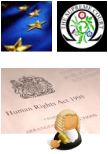
There are a number of growing interconnections between POLITICS and the LAW and these have become much more intense and volatile (unstable) in recent years.... WHY ?
- The introduction of the HUMAN RIGHTS ACT (1998)
- Membership of the EUROPEAN UNION (EU)
- The growth of JUDICIAL REVIEW
- Blair's Labour Government successfully separated the Judicial and legislative functions by creating the BRITISH SUPREME COURT
|
|
|
